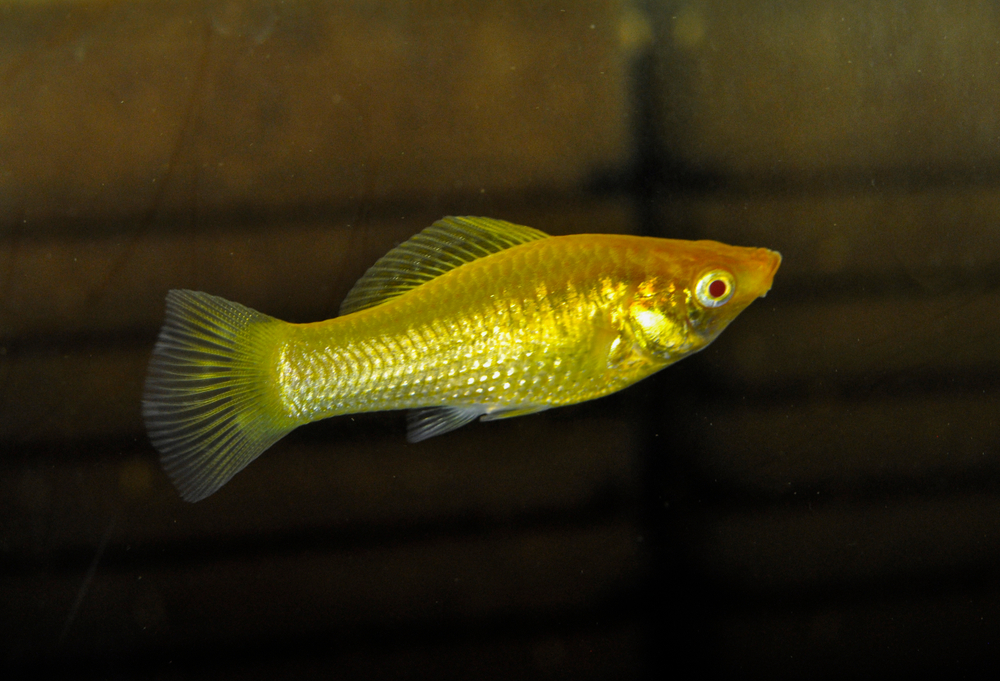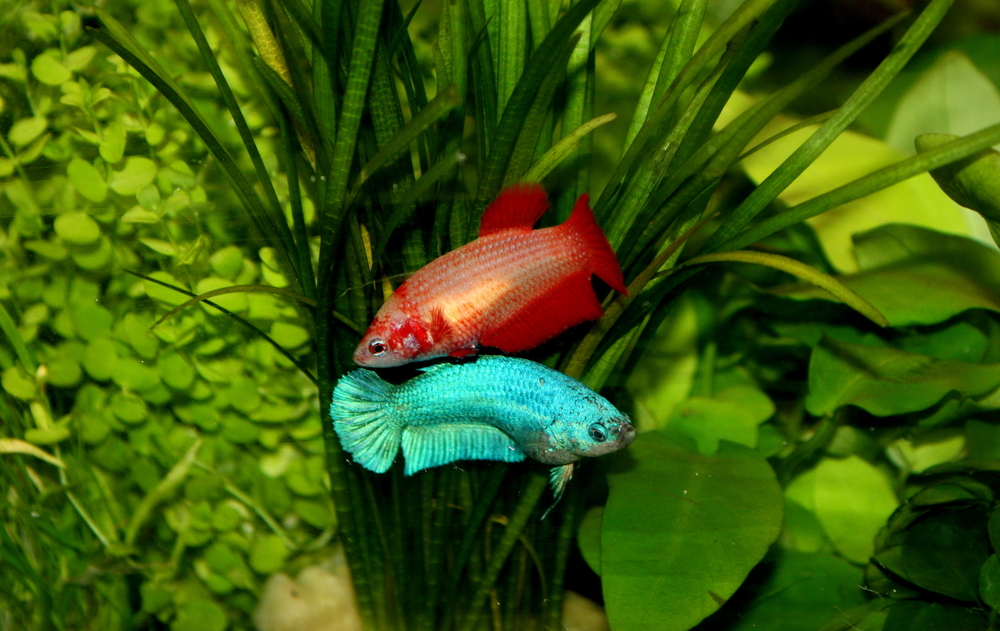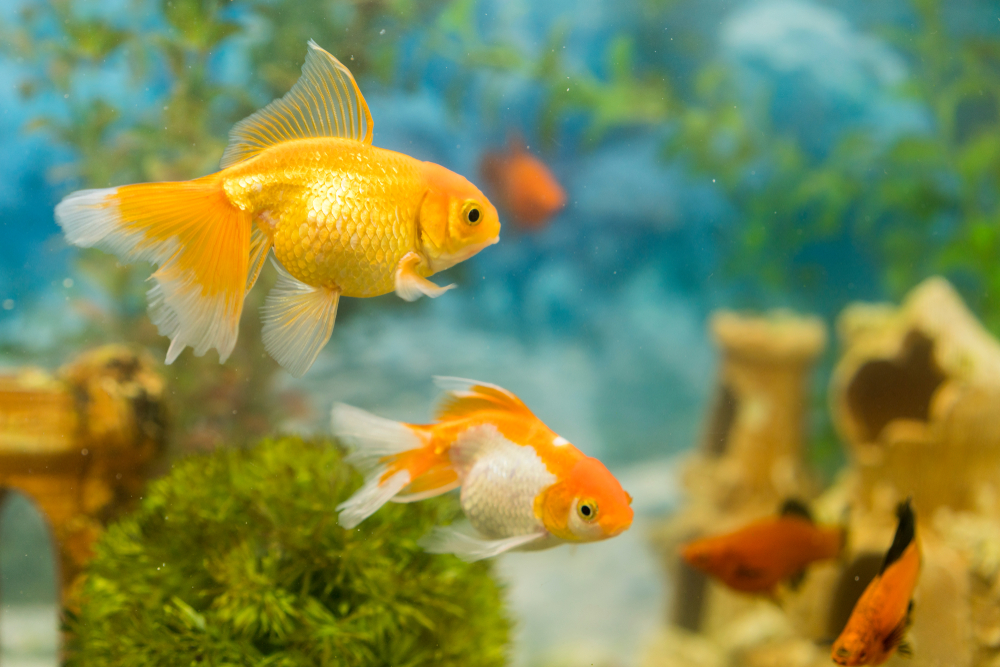Aquarium enthusiasts often explore the dynamic of housing different fish species together, and a common inquiry is whether betta fish can coexist peacefully with guppies.
Both species are popular for their vibrant colors and unique finnage, yet their compatibility in a shared environment relies on several factors. It is crucial to consider the temperament of individual fish, the aquarium size, and the conditions within to ensure a harmonious tank.
While bettas are known for their territorial nature, especially amongst males, a well-planned tank layout with ample space and hiding spots can mitigate aggression. Guppies, on the other hand, are generally peaceful and sociable.
They can thrive in the same water parameters suitable for bettas, making the physical requirements of their habitat easily compatible. To successfully introduce betta fish and guppies, one must pay close attention to their individual needs and behaviors.
Contents
Key Takeaways on Can Betta Fish Live with Guppies?
- Bettas and guppies can share an aquarium if their behavior and space requirements are properly managed.
- Both fish species have similar water parameter needs, simplifying tank conditions.
- Careful attention to tank setup and fish personality is essential for cohabitation success.
You will also like:
Understanding Betta and Guppy Fish
In maintaining aquarium harmony, it is pivotal to comprehend the specific traits and natural origins of betta fish and guppies. Their cohabitation is contingent on an informed approach to their differing species characteristics and habitats.
Species Characteristics
Betta Fish:
- Scientific Name: Betta splendens
- Family: Osphronemidae
- Identification: Often known for their vibrant coloration and long, flowing fins, particularly in males.
- Temperament: Male bettas are notorious for being territorial and may exhibit aggression towards other fish, especially those with similar appearances.
Guppies:
- Scientific Name: Poecilia reticulata
- Family: Poeciliidae
- Identification: Guppies are smaller and known for their dazzling, multicolored tails, with males displaying brighter colors and larger tails than females.
- Temperament: Generally peaceful and sociable, making them popular for community tanks.
Natural Habitats
Betta: A tropical freshwater fish native to Southeast Asia, betta fish are accustomed to warm, stagnant waters, like rice paddies and slow-moving streams. Their labyrinth organ allows them to breathe surface air, adapting to low-oxygen environments.
Guppies: Originating from the freshwater streams of South America, guppies are resilient fish that adapt to a range of conditions. Like bettas, they thrive in warm waters but are used to more dynamic environments, including rivers and lakes.
Guppies belong to the Poeciliidae family and are livebearers, giving birth to free-swimming young rather than laying eggs.
Aquarium Setup and Conditions
Creating harmonious living conditions for betta fish and guppies necessitates careful consideration of tank size, water parameters, and the tank environment.
Tank Size Requirements
For housing betta fish with guppies, a minimum tank size of 10 gallons is recommended. Betta fish need space to establish their territory, while guppies thrive in social settings with adequate room to swim.
Water Parameters
The water quality is paramount and should include a temperature range between 75°F and 82°F (24°C to 28°C) to accommodate both species. Maintain pH levels between 6.5 and 7.5, ensuring a balance crucial for both betta fish and guppies.
Tank Environment
An optimal tank setup will include abundant live plants and aquatic plants, providing hiding spaces to reduce stress and aggression. Incorporating caves and other decorations can offer refuge and enhance the habitat, supporting a peaceful coexistence.
Behavior and Compatibility
When considering housing betta fish with guppies, it’s essential to understand the distinct behaviors and compatibility of each species. This understanding guides keepers in creating a harmonious shared environment.
Betta Behavior
Betta fish are known for their aggressive and territorial nature, especially males toward each other. They exhibit this behavior to establish a pecking order within their territory.
Each betta fish has a personality that can range from relatively peaceful to highly aggressive, which directly affects their ability to cohabitate with other fish. The presence of other colorful or finned fish, like guppies, can sometimes trigger a betta’s aggression, leading to stress and bullying.
Guppy Behavior
In contrast, guppies are generally peaceful and sociable creatures. They exhibit gregarious behavior, often swimming in groups, and are not known to be aggressive. However, due to their bright colors and flowing tails, guppies can inadvertently provoke betta fish if the betta perceives them as rivals.
Species Interactions
The key to successful compatibility lies in the interactions between betta fish and guppies. While bettas may exhibit territorial behavior, establishing ample space and hiding spots can reduce stress levels and aggression.
However, even with the right conditions, not all bettas will tolerate guppies. It’s critical to observe their behavior carefully when keeping betta fish and guppies together, ensuring the betta does not target the guppies due to their flashy appearance and ceaseless movement.
Diet and Feeding
When housing betta fish with guppies, understanding and managing their respective diets is crucial. Betta fish are primarily carnivorous and require a high-protein diet, while guppies are omnivorous and can consume a more varied diet.
It’s important to cater to each species’ needs to maintain their health and reduce competition for food.
Betta Diet
Bettas thrive on a diet that is rich in protein. They often prefer live or frozen foods such as bloodworms, brine shrimp, or daphnia. However, for convenience, high-quality betta-specific pellets can also provide the necessary protein that these fish need.
It’s suggested to occasionally offer treats, but these should not make up the bulk of the diet.
Guppy Diet
Guppies are less particular, enjoying an omnivorous diet that includes algae, brine shrimp, and vegetable matter. They do well with flakes and pellets formulated for tropical fish, which provide a balanced diet.
Guppies also benefit from the occasional treat like live or freeze-dried foods, which can add variety to their diet and is good for their overall health.
Feeding Considerations
When feeding bettas and guppies together, separate feeding strategies may be necessary to ensure each fish gets the right nutrition.
Bettas might need to be fed with a floating pellet to accommodate their surface-feeding behavior, while guppies can be provided with slow-sinking flakes or pellets that distribute throughout the tank.
Overfeeding must be avoided to prevent water quality issues, and a scheduled feeding routine should be established, typically one to two times a day.
Careful observation during feeding times can help prevent aggression and ensure that both bettas and guppies are consuming an appropriate amount of food tailored to their dietary needs.
Health and Care
Maintaining optimal health and ensuring proper care are crucial when housing betta fish and guppies together. They require a balanced diet and clean, stable water conditions to keep their immune systems strong and prevent common health issues.
Common Health Issues
Betta fish are prone to fin rot, a condition often caused by poor water quality that can be exacerbated by stress and overcrowding.
Guppies, on the other hand, can suffer from diseases like guppy disease or tail rot, both of which affect their vibrant tail fins. Both species require diligent observation as early detection and treatment are key to managing these conditions.
Tank Maintenance
Water quality plays a vital role in the health of betta fish and guppies. Regular tank maintenance procedures should include:
- Weekly water changes of 25-30%
- Consistent monitoring of water parameters such as pH, which should be maintained between 6.8-7.8 for guppies and around 7 for bettas
- Temperature control, keeping the water between 74-82°F for guppies and 78-80°F for bettas to overlap their comfortable ranges
Providing a varied diet helps prevent nutritional deficiencies and issues like constipation, a common problem especially in bettas. Both species benefit from a mixture of high-quality flakes or pellets, with the occasional brine shrimp or daphnia to ensure a balanced diet.
Remember, an appropriate feeding schedule and amount are critical to reduce waste and maintain water quality.
Social Dynamics and Tank Mates
Understanding the social dynamics of aquarium inhabitants is crucial when curating a community tank. Certain species thrive in a peaceful environment, while others have more assertive personalities that may lead to aggression.
Community Tank Composition
A well-structured community tank should cater to the varying needs and temperaments of its inhabitants. It is important to consider the personalities of different species and their compatibility.
In a community aquarium, bettas are known for their territorial nature, and their preference for solitude should be respected. To create a peaceful tank, one must ensure there is ample space for each fish to establish its own territory, reducing potential conflicts.
- Guppies: Colorful and active, requiring space to swim.
- Corydoras Catfish: Ground dwellers that are peaceful and can coexist with bettas due to their different swimming levels.
- Platies: Peaceful fish that generally do not provoke aggression from bettas.
- Tetras: Small and lively, some tetra species can be fin nippers, which may aggravate bettas.
- Mollies: Share a similar diet to bettas and can live peacefully if the tank is spacious enough to prevent competition.
When introducing different species into a community tank, it’s important to monitor their interactions closely and be prepared to separate them if necessary.
Suitable Tank Mates

Identifying suitable tank mates for bettas involves selecting non-aggressive and dissimilar-looking fish to avoid triggering the betta’s territorial behavior. Fish that resemble bettas too closely, especially those with flowing fins or bright colors, are likely to provoke a response.
- Guppies: Carefully considered; male guppies with vibrant colors and long tails might be mistaken for small bettas and attacked.
- Corydoras Catfish: Because of their peaceful nature, different swimming ranges, and dissimilar appearance, they are excellent companions for bettas.
- Platies: Typically good tank mates due to their non-aggressive behavior and their ability to coexist without inciting the betta’s aggression.
- Tetras: Depends on the species; neon tetras are often compatible while others may nip at fins.
- Mollies: Generally a safe choice provided the aquarium allows for adequate space and resources.
When planning a community aquarium, careful consideration of each species’ requirements and dispositions is key to achieving harmony among tank mates.
Breeding and Life Cycle
In the aquatic realm of home aquariums, understanding the breeding and life cycle of fish is crucial for successful cohabitation and tank management.
This section will detail how Betta fish and Guppies reproduce, their age-related behaviors, and typical lifespan, shedding light on the considerations needed for breeding and raising guppy fry alongside displaying Bettas.
Betta Breeding
Betta fish, also known as Siamese fighting fish, are known for their vivid display during mating rituals. Breeding Bettas requires specific conditions: a male and a female Betta are introduced with the male often building a bubble nest as part of the courtship behavior.
The lifespan of a Betta fish generally ranges from 3 to 5 years, and they can begin breeding around 4 to 12 months of age. After spawning, the male Betta takes on the role of guarding the eggs, which is a unique aspect of their breeding behavior.
Guppy Breeding
Guppies, on the other hand, are prolific breeders and give live birth to their young, known as fry. They do not require elaborate displays like Bettas, and the breeding process can occur often and quickly within the community tank setting.
Guppies breed year-round and have a gestation period of about 21-30 days. With a lifespan similar to Bettas, approximately 1 to 2 years in captivity, Guppies can begin breeding as early as 3 months of age.
Guppy fry are born fully developed and are able to swim and fend for themselves immediately, which is essential when sharing a tank with other fish species.
Conclusion

Betta fish and guppies can cohabit under the right conditions. Each species has specific requirements, and their compatibility lies in meeting these without compromise. In ensuring a peaceful tank environment:
- Tank size is critical, with larger volumes providing ample space for both species to coexist.
- Water parameters should be closely matched; guppies thrive in a pH of 6.8-7.8 and a temperature range of 74-82°F, while bettas prefer a pH of 7 and temperatures between 78-80°F.
It is essential to remember that bettas may exhibit aggression. One should be attentive to the behavior of the individual betta. Introducing more female guppies to a single male can help reduce aggression, and having a sorority of female bettas, typically no more than five, can also be a peaceful arrangement.
Aquarists should provide hiding places and plant coverage to allow guppies to escape unwanted attention and to reduce stress on both species.
Moreover, there are similarities in their dietary needs; both species are amenable to a varied diet including flakes, pellets, and live food, although bettas require a higher protein intake due to their carnivorous nature.
With careful planning, monitoring, and consideration for each species’ needs, bettas and guppies may live together successfully. This coexistence hinges on a harmonized environment that caters to their space, dietary, and behavioral necessities, ultimately leading to a tranquil and healthy aquatic habitat.
Frequently Asked Questions
When considering the cohabitation of betta fish and guppies, it’s imperative to address common concerns regarding safety, compatibility, and tank environment to ensure harmonious living conditions.
Is it safe to house betta fish and guppies together?
It is possible for betta fish and guppies to live together, though it requires careful planning and consideration of both species’ behaviors and requirements.
What are the risks of keeping bettas and guppies in the same tank?
The primary risks include aggression from betta fish towards guppies due to bright colors and flowing tails that can be mistaken for other bettas, which may lead to stress and harm.
Are female bettas less aggressive towards guppies than male bettas?
Female bettas tend to exhibit less aggression than males and might coexist more peacefully with guppies, reducing the risk of confrontations.
How can one ensure a peaceful coexistence between betta fish and guppies?
To promote peace, provide ample space, hiding spots, and monitor fish interactions closely. Ensuring a stress-free environment is crucial for cohabitation.
What size tank is recommended for both bettas and guppies to live together?
For both species to thrive, a tank size of at least 10 gallons is recommended, allowing sufficient space for swimming and territory establishment.
What are some compatible tank mates for betta fish other than guppies?
In addition to guppies, betta fish may coexist with other peaceful and non-flashy fish such as corydoras catfish, snails, and certain shrimp species.

Ian Sterling, founder of Fishlab.com, began his aquarium journey over 30 years ago, driven by a deep fascination for fish and their diverse personalities. His website, Fishlab.com, is dedicated to making fishkeeping accessible and enjoyable, offering beginner-friendly guidance, expert insights, and a community for aquarists to connect and share experiences.


